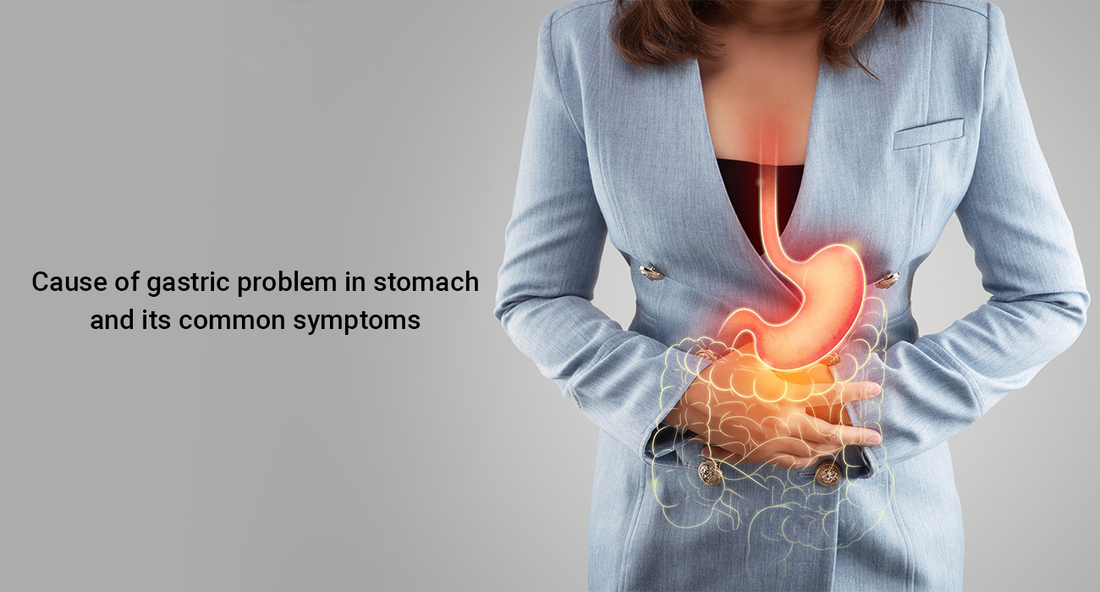Gastric problems are common and can affect anyone. From mild discomfort to severe pain, the question "why gastric happen" is frequently asked. This article will explore the causes of gastric issues, focusing on why gastric happens, especially during fasting, and offer some preventive measures.
What Does "Why Gastric Happen" Mean?
The term "gastric" refers to anything related to the stomach. When people ask, "why does gastric happen," they're typically referring to issues like gas, bloating, indigestion, or gastric pain. These symptoms can be caused by a variety of factors ranging from diet to lifestyle choices.

Common Causes of Gastric Problems
1. Poor Eating Habits
Poor eating habits are a significant contributor to gastric problems. Foods that are high in fats, overly spicy, or contain a lot of acids can irritate the stomach lining and cause acid reflux. Fatty foods, in particular, tend to stay in the stomach longer, which requires more acid secretion for digestion, thereby increasing the risk of acid reflux. Overeating can exacerbate these issues because a full stomach puts extra pressure on the esophageal sphincter, the valve that keeps stomach contents from moving backward into the esophagus. This can lead to heartburn and discomfort.
2. Stress and Anxiety
Stress and anxiety can significantly impact digestive health. They are known to stimulate the brain to release certain hormones and chemicals that can interfere with digestive processes. This reaction can increase the production of stomach acid, making the stomach lining more susceptible to irritation. Stress can also contribute to behaviors such as eating too quickly, eating at irregular times, or choosing unhealthy foods, all of which can further aggravate gastric symptoms.
3. Medications
Certain medications can also be culprits in causing gastric distress. Non-steroidal anti-inflammatory drugs (NSAIDs), like ibuprofen and aspirin, can irritate the stomach lining and increase acid production. Similarly, some antibiotics and steroids may have side effects that include gastric irritation and acid reflux. Patients often face a dilemma when they need these medications for their primary health issues but then have to manage the gastric side effects they provoke.
4. Medical Conditions
Various medical conditions directly lead to gastric problems, often answering the question, "Why does gastric happen?" with a clear medical rationale:
Gastroesophageal Reflux Disease (GERD): This is a condition where stomach acid frequently flows back into the tube connecting your mouth and stomach (esophagus). This backwash (acid reflux) can irritate the lining of your esophagus and cause significant discomfort and long-term complications if not managed.
Ulcers: These are sores that develop on the lining of the stomach, small intestine, or esophagus. They are often caused by an overproduction of stomach acid or bacterial infection.
Gastritis: This is an inflammation of the stomach lining. It can be acute or chronic, and its symptoms can include stomach pain, nausea, and vomiting. Gastritis can be caused by the same factors that lead to ulcers, including stress, excessive alcohol consumption, and prolonged use of NSAIDs.
Understanding these causes can help in managing and mitigating gastric problems by adopting healthier eating habits, managing stress, using medications wisely, and treating underlying medical conditions appropriately.
Types of gastric problems
Gastric problems can encompass a range of issues that affect the stomach and digestion. Here are some of the common types of gastric problems, along with detailed explanations of their causes, symptoms, and potential treatments:
1. Gastritis
Gastritis is inflammation of the stomach lining. It can be acute, occurring suddenly, or chronic, persisting over time. Common causes include long-term use of NSAIDs (non-steroidal anti-inflammatory drugs), excessive alcohol consumption, stress, and infections, particularly with bacteria such as Helicobacter pylori. Symptoms may include abdominal pain, nausea, vomiting, bloating, and a feeling of fullness in the upper abdomen after eating. Treatment often involves taking medications to reduce stomach acid, such as proton pump inhibitors or antacids. Eradicating H. pylori with antibiotics is also a common approach if this bacterium is the cause.
2. Peptic Ulcers
Peptic ulcers are open sores that develop on the inner lining of the stomach (gastric ulcers) or the upper part of the small intestine (duodenal ulcers). Like gastritis, peptic ulcers are often caused by H. pylori infections and the use of NSAIDs. Excessive acid production can also contribute to the development of ulcers. The most common symptom is stomach pain. Other symptoms include bloating, heartburn, indigestion, and nausea. Severe ulcers can lead to bleeding, noticeable in vomit or stool. Treatment includes medications to reduce acid levels, protect the lining of the stomach, and antibiotics to treat H. pylori infection.
3. Gastroesophageal Reflux Disease (GERD)
GERD is a chronic condition where stomach acid frequently flows back into the tube connecting your mouth and stomach (esophagus). Causes include a weakened lower esophageal sphincter, obesity, pregnancy, and smoking. Certain foods and drinks can exacerbate the issue. Symptoms include heartburn, regurgitation of food or sour liquid, chest pain, and difficulty swallowing. Lifestyle changes such as dietary modifications, losing weight, and avoiding triggers are primary treatments. Over-the-counter antacids can help, but more severe cases might require stronger medications like H2 receptor blockers or proton pump inhibitors.
4. Gastroenteritis
Often referred to as stomach flu, this is an inflammation of the gastrointestinal tract involving the stomach and the small intestine. Viral or bacterial infections are common causes. Contaminated food or water can also lead to gastroenteritis. Symptoms include diarrhea, vomiting, abdominal cramps, and nausea. Fever and general weakness may also occur. Treatment primarily involves staying hydrated. Over-the-counter remedies can help alleviate symptoms. Severe cases, especially those caused by bacteria, may require antibiotics.
5. Bloating and Gas
Bloating involves a full, tight feeling in the abdomen, often due to an excess buildup of gas in the stomach and intestines. Bloating can be caused by swallowing air, eating certain foods, or digestive disorders. Conditions such as irritable bowel syndrome (IBS) can also cause chronic bloating. Feelings of fullness, swelling in the abdominal area, and abdominal pain are common symptoms. Dietary changes are the most common treatment, including reducing intake of gas-producing foods. Over-the-counter products like simethicone can also help relieve gas.
6. Constipation
Constipation is a common digestive problem where individuals have fewer than three bowel movements a week. Causes include low fiber diets, inadequate water intake, lack of physical activity, medication side effects, and ignoring the urge to have a bowel movement. Symptoms include fewer bowel movements, straining during bowel movements, and hard or small stools. Increasing fiber intake, drinking more water, and exercising can help. In some cases, over-the-counter or prescription laxatives may be necessary.
Why Gastric Happens in Fasting
Fasting, especially prolonged periods without eating, can lead to gastric problems. When the stomach is empty, acid can build up and irritate the stomach lining. This is why gastric happens in fasting and can lead to discomfort or pain. During fasting, it's crucial to drink water and stay hydrated to help minimize acid buildup and reduce gastric symptoms.
Prevention and Management of Gastric Issues
Dietary Adjustments: To answer the question of "why gastric happen" with action, start by adjusting your diet. Eat balanced meals, avoid excessive spicy or fatty foods, and eat smaller portions more frequently.
Manage Stress: Since stress can lead to gastric problems, managing your stress through techniques like meditation, exercise, or therapy can help.
Medication Management: If you're asking "why does gastric happen" despite taking precautions, review your medications with your doctor. They might be contributing to your gastric issues.
Regular Meals during Fasting: If wondering why gastric happens in fasting, consider introducing small snacks that are gentle on the stomach during fasting periods to help manage acid levels.
Dietary Tips for Managing Gastric Pain

Foods to Eat:
Lean Proteins: Including chicken, fish, and turkey in your diet can be easier on your stomach compared to fatty meats.
Low-Fat Dairy: Opt for low-fat or fat-free dairy products to reduce the risk of stomach discomfort.
Whole Grains: Foods like oats, brown rice, and whole grain breads are high in fiber, aiding digestion and preventing constipation.
Vegetables: Green vegetables like spinach, asparagus, and cucumbers are gentle on the stomach. However, avoid raw veggies during acute episodes as they can be harder to digest.
Fruits: Bananas, melons, and apples (without skin) are excellent for a sensitive stomach. Avoid citrus fruits which can aggravate symptoms.
Foods to Avoid:
Spicy Foods: These can irritate the stomach lining and increase acid production.
Caffeine and Alcohol: Both stimulate acid production and can worsen symptoms of gastric pain.
Fatty and Fried Foods: These are harder to digest and can increase stomach pain.
Acidic Foods: Tomatoes and citrus fruits can trigger or worsen symptoms.
Chocolate: It contains caffeine and other stimulants that can increase acid production.
The Role of Lifestyle in Gastric Health
Exercise: Regular physical activity helps the digestive system work more efficiently and reduces stress, a common trigger for gastric issues.
Sleep: Adequate sleep is crucial for overall digestive health. Lack of sleep can worsen symptoms of acid reflux and overall gastric discomfort.
Stress Management: High levels of stress can lead to an increase in acid production and stomach pain. Techniques such as yoga, meditation, and deep breathing can help manage stress effectively.
Medical Treatments and Remedies
Over-the-Counter Medications:
Antacids: Provide quick relief by neutralizing stomach acid.
H2 Blockers: Reduce stomach acid production (e.g., ranitidine).
Proton Pump Inhibitors (PPIs): Decrease the amount of acid produced in your stomach (e.g., omeprazole).
Prescription Drugs:
For severe cases, stronger doses of H2 blockers and PPIs, or medications like prokinetics, which help strengthen the lower esophageal sphincter, are available through prescription.
Natural Remedies:
Ginger: Known for its gastrointestinal soothing effects.
Peppermint: Can relax stomach muscles and improve bile flow, but should be used cautiously as it can also aggravate heartburn in some people.
Chamomile Tea: A gentle relaxant that can help ease stomach discomfort.
When to See a Doctor
It's important to seek medical attention if you experience:
Persistent Pain: Pain that doesn't go away with over-the-counter treatments or dietary adjustments.
Trouble Swallowing: This could indicate an esophageal problem or a blockage.
Vomiting Blood or Black Stool: These are signs of internal bleeding.
Unintended Weight Loss: Can indicate a more serious underlying condition.
Severe Dehydration Symptoms: Such as dry mouth, dizziness, and severely decreased urine output.
Recognizing these signs and seeking appropriate medical help is crucial for effective management and to prevent complications associated with gastric issues.





